Product
Actually the tool your practice needs.
Easily calculate complex carbon, cost and building performance estimates for your architectual design projects.
How it works
Model & Export
Model all the building design elements such as floors, walls, windows, doors, ceilings, soffits, and roofs using Archicad or Revit.
Assign spaces to the building design.
Classify and label model elements using the Actually classification system.
Export the complete modelled design as an IFC file.
Upload & Specify
Upload the IFC file to Actually.
Once the file is uploaded, select the building products that best fit your design.
Make selections from over 9000 products currently housed in Actually.
Review & Report
Review product selections side-by-side with other building products.
With this comparative information, make informed choices about building products that best fit the cost, environmental and performance goals of the project. Selections are made easy as estimates are updated in real time.
When product selections are finalised, click Report. Actually supplies comprehensive industry standard reporting with the final click of a button.
Product
Actually the tool your practice needs.
Easily calculate complex carbon, cost and building performance estimates for your architectual design projects.
How it works
Model & Export
Model all the building design elements such as floors, walls, windows, doors, ceilings, soffits, and roofs using Archicad or Revit.
Assign spaces to the building design.
Classify and label model elements using the Actually classification system.
Export the complete modelled design as an IFC file.
Upload & Specify
Upload the IFC file to Actually.
Once the file is uploaded, select the building products that best fit your design.
Make selections from over 9000 products currently housed in Actually.
Review & Report
Review product selections side-by-side with other building products.
With this comparative information, make informed choices about building products that best fit the cost, environmental and performance goals of the project. Selections are made easy as estimates are updated in real time.
When product selections are finalised, click Report. Actually supplies comprehensive industry standard reporting with the final click of a button.
Key Features
Key Features
Import IFC files from CAD software
Actually uses imported IFC files from ArchiCAD or Revit to source the geometry of a project.
This means the CAD model you’re already working on is used to generate project estimates. Once the modelled elements are classified, a suitable IFC file can be created. When design changes occur, the file can be re-imported, automatically updating the project geometry.
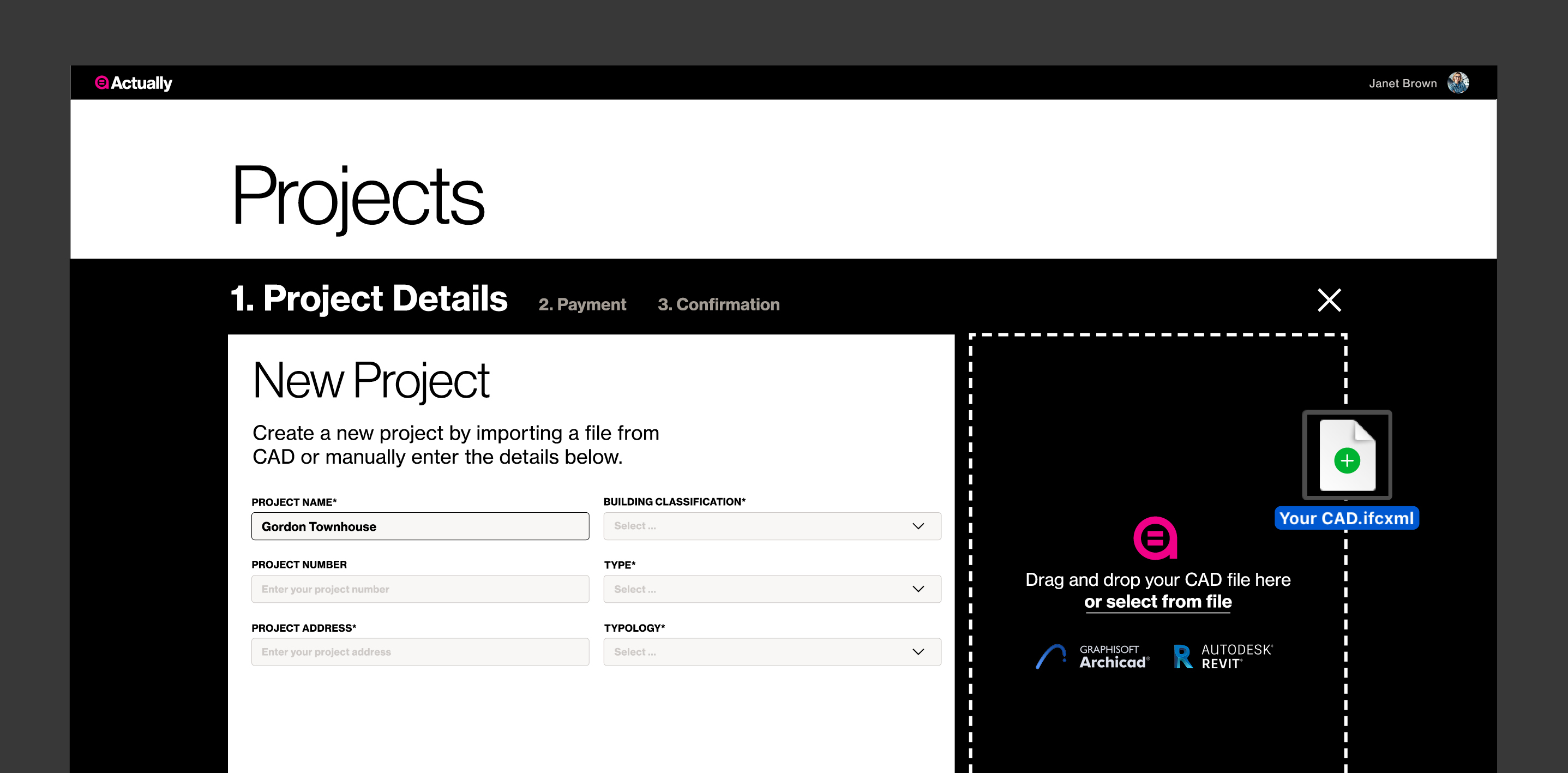
Real world data
Actually accesses up-to-date and accurate climate, cost and environmental data for building projects. This means that all background calculations are undertaken in-line with international standards, using current data from Cost Builder and BRANZ.
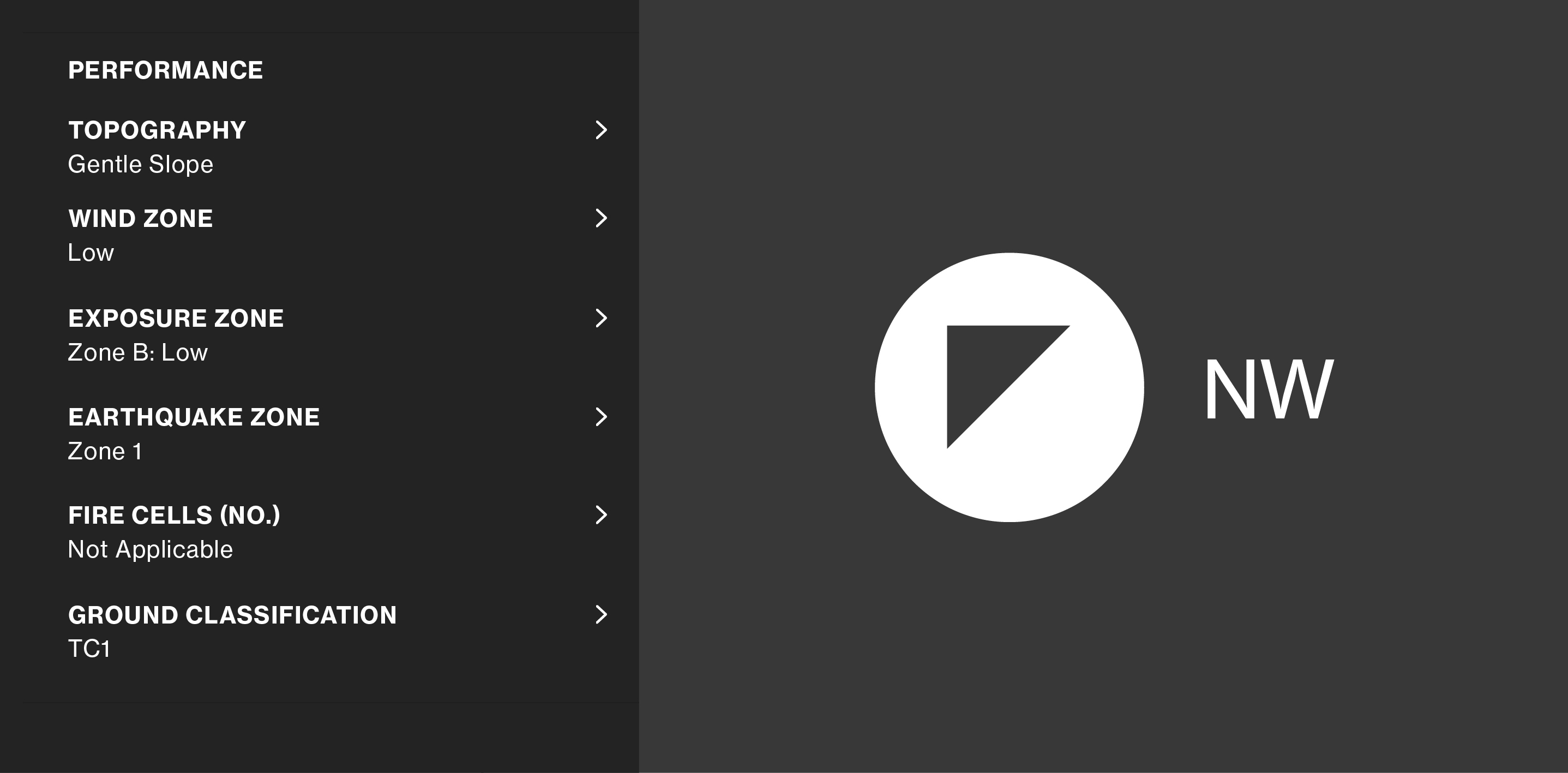
Real-time calculations
Estimates for cost, carbon and performance are updated in real time so users can easily compare materials; and assess the impact of their decisions in relation to the overall goals of a project.
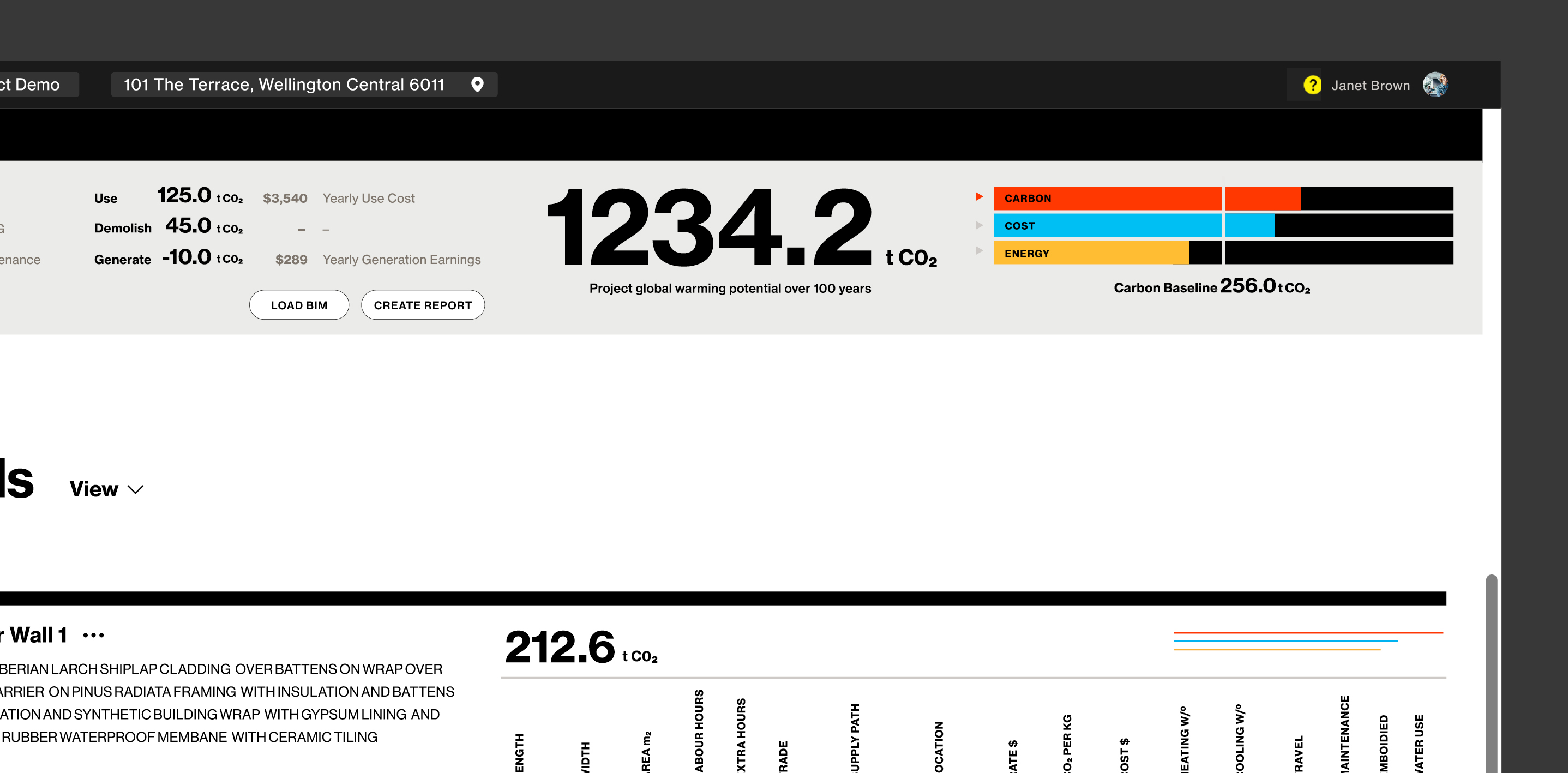
Side-by-side material comparison
Actually's ‘Compare’ function enables users to assess multiple building products from a cost, carbon and performance perspective, and to make informed choices about design specifications based on this comparison. As well as considering each material as an individual line item, users can view the impact of their selections on the overall project using the estimates supplied in the project dashboard.
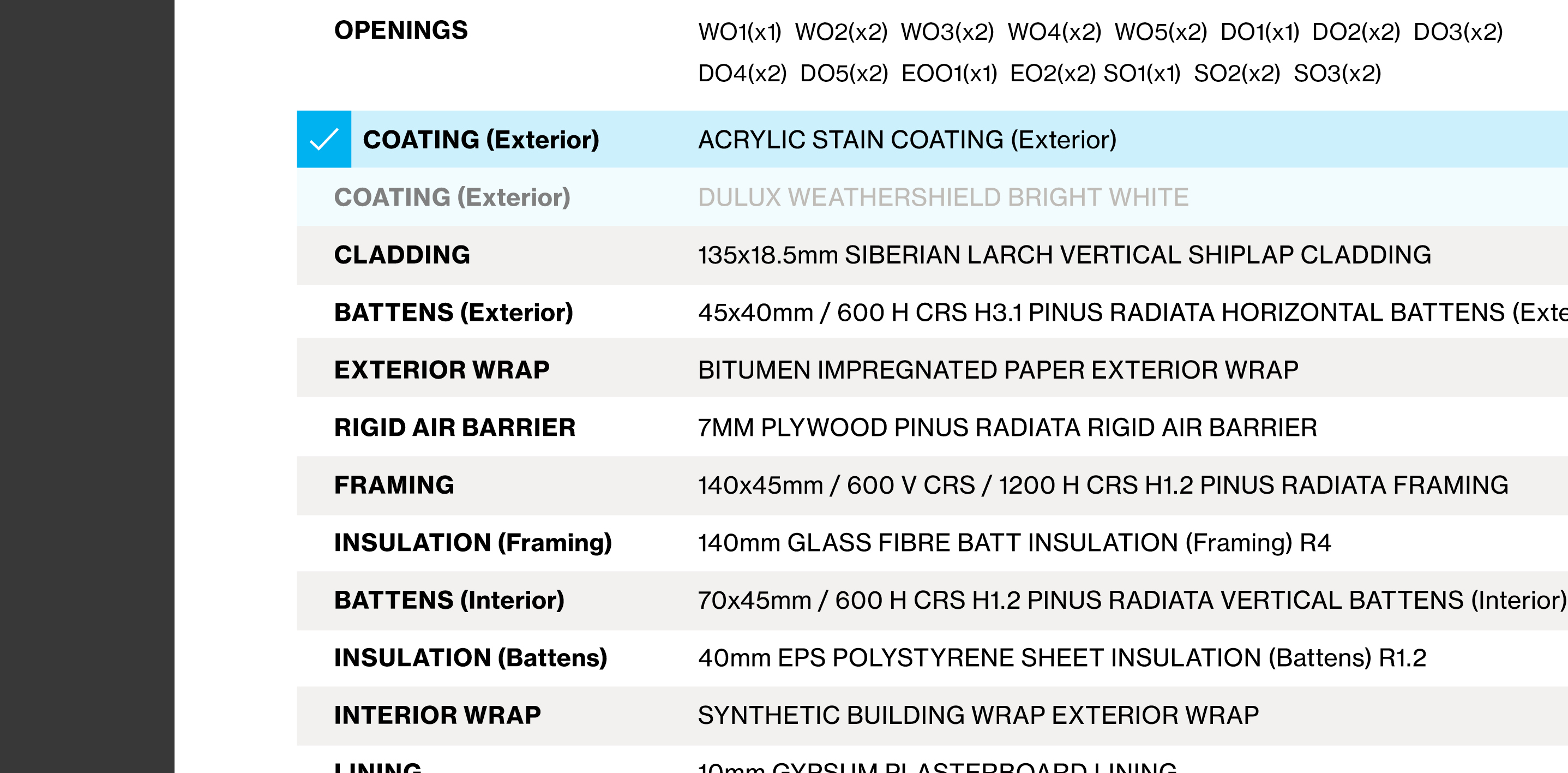
LCA Calculation Method
Calculating the environmental impact of a project can be complex, with numerous standards and schemes to navigate.
Actually simplifies this process by allowing users to select an LCA Calculation Method that aligns with their specific compliance needs. This ensures that your Assessment Period, Life Cycle Module combination, and Building Scope are perfectly matched to the required standards, making compliance straightforward and hassle-free.
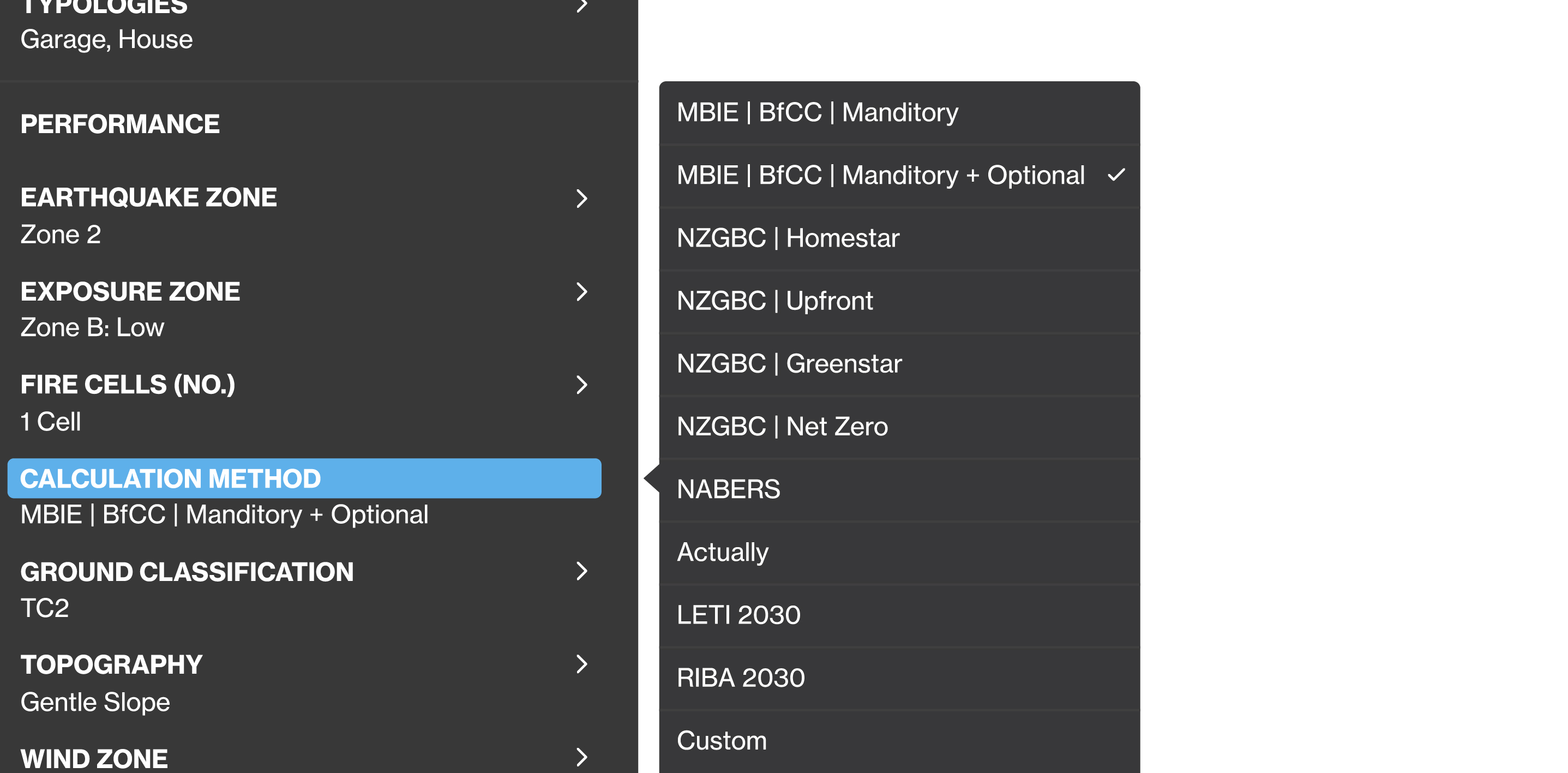
Industry standard reporting
Ready to share the cost, carbon and performance estimates of a design?
Actually generates a downloadable .PDF report. These in-depth reports are well-presented and clearly structured so they can be sent directly to stakeholders, or government agencies. Simple one-page summaries can be shared with clients, while detailed sections of an Actually report can be used to substantively demonstrate compliance with project targets.
An Actually report includes:
- Client friendly impact summaries on cost, carbon and energy use.
- Carbon quantities at Element and Component level, including Allowances, Omissions and existing Elements.
- Cost quantities in the form of a Schedule of Quantities and a Trade Summary.
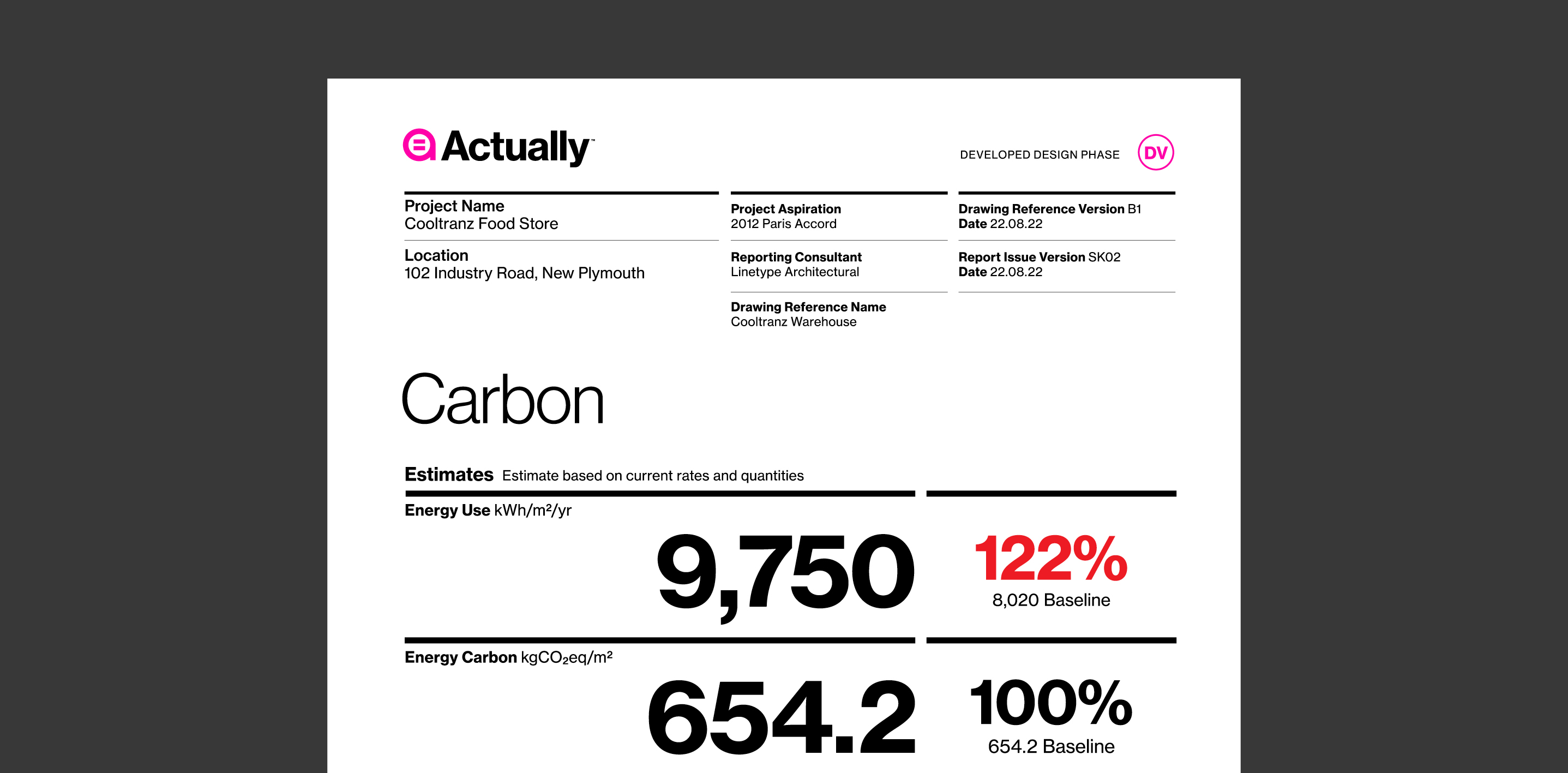
Import IFC files from CAD software
Actually uses imported IFC files from ArchiCAD to source the geometry of a project.
This means that the CAD model the user is already working on is utilised to generate project estimates. There’s no extra design work, or time consuming data input required. When design changes are made to the project, the file can be re-imported and the project geometry will be automatically updated.
The more detailed the model, the more accurate Actually’s estimates are.

Real World Data
Actually accesses up-to-date and accurate climate, cost and environmental data for building projects. This means that all background calculations are undertaken in-line with international standards, using current data from Cost Builder and BRANZ.

Real-time Calculations
Estimates for cost, carbon and performance are updated in real time so users can easily compare materials; and assess the impact of their decisions in relation to the overall goals of a project.

Side-by-side material comparison
Actually's ‘Compare’ function enables users to assess multiple building products from a cost, carbon and performance perspective, and to make informed choices about design specifications based on this comparison. As well as considering each material as an individual line item, users can view the impact of their selections on the overall project using the estimates supplied in the project dashboard.

LCA Calculation Method
Calculating the environmental impact of a project can be complex, with numerous standards and schemes to navigate.
Actually simplifies this process by allowing users to select an LCA Calculation Method that aligns with their specific compliance needs. This ensures that your Assessment Period, Life Cycle Module combination, and Building Scope are perfectly matched to the required standards, making compliance straightforward and hassle-free.

Industry standard reporting
Ready to share the cost, carbon and performance estimates of a design?
Actually generates a downloadable .PDF report. These in-depth reports are well-presented and clearly structured so they can be sent directly to stakeholders, or government agencies. Simple one-page summaries can be shared with clients, while detailed sections of an Actually report can be used to substantively demonstrate compliance with project targets.
An Actually report includes:
- Client friendly impact summaries on cost, carbon and energy use.
- Carbon quantities at Element and Component level, including Allowances, Omissions and existing Elements.
- Cost quantities in the form of a Schedule of Quantities and a Trade Summary.

Exclusive to Actually
Exclusive to Actually
Baselines
The start of any project can feel daunting. To help take away some of the guess work Actually provides Baselines for every project. Baselines are cost and carbon estimate averages that Actually generates using data points from projects comparable to the one the user is working on. This makes it easier for users to evaluate project estimates and goals in comparison to projects of a similar scale.
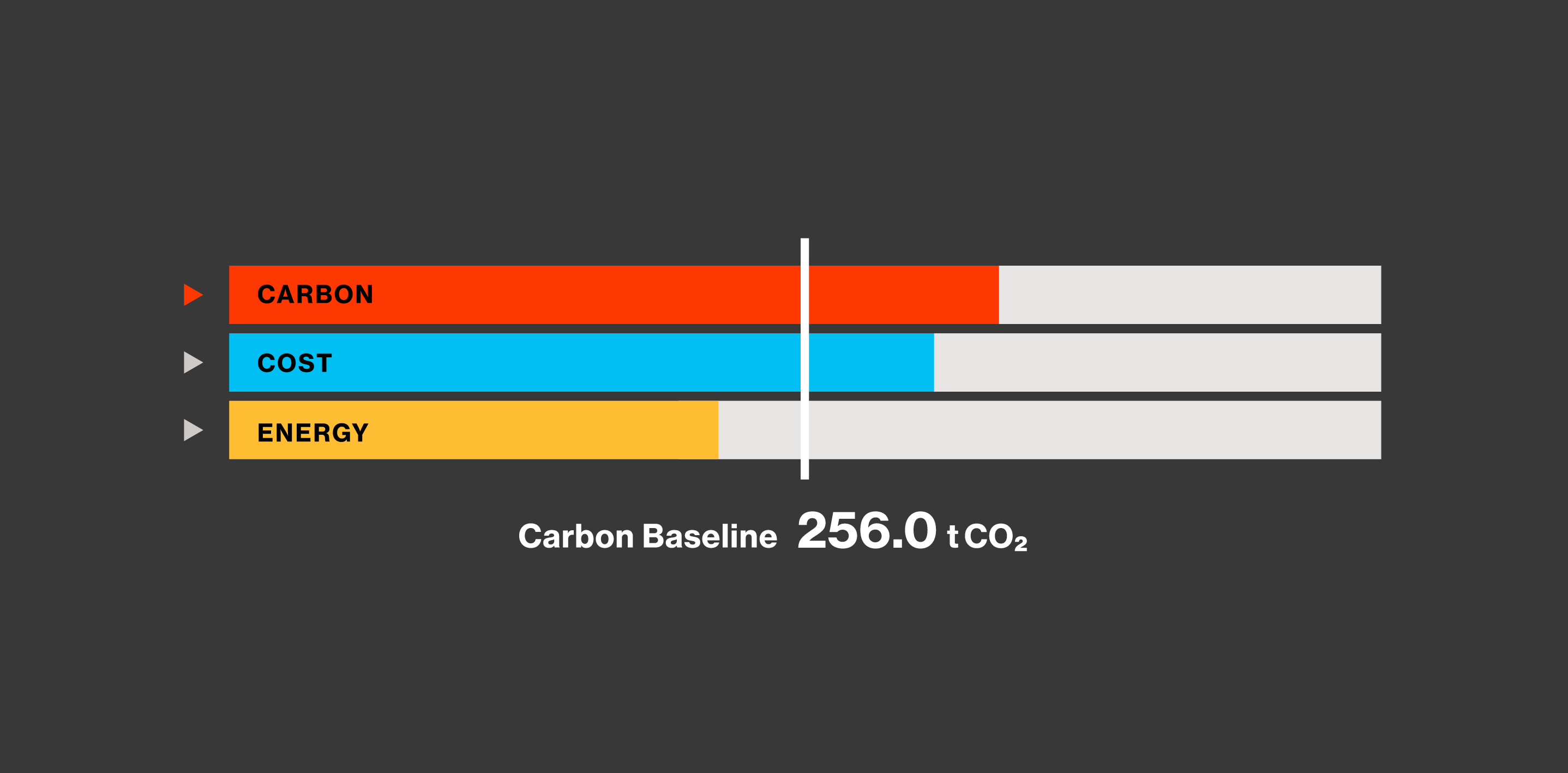
Assemblies
In Actually, users can generate their own Assemblies from their most commonly used build components. These Assemblies can then be added to the Elements of a project quickly.
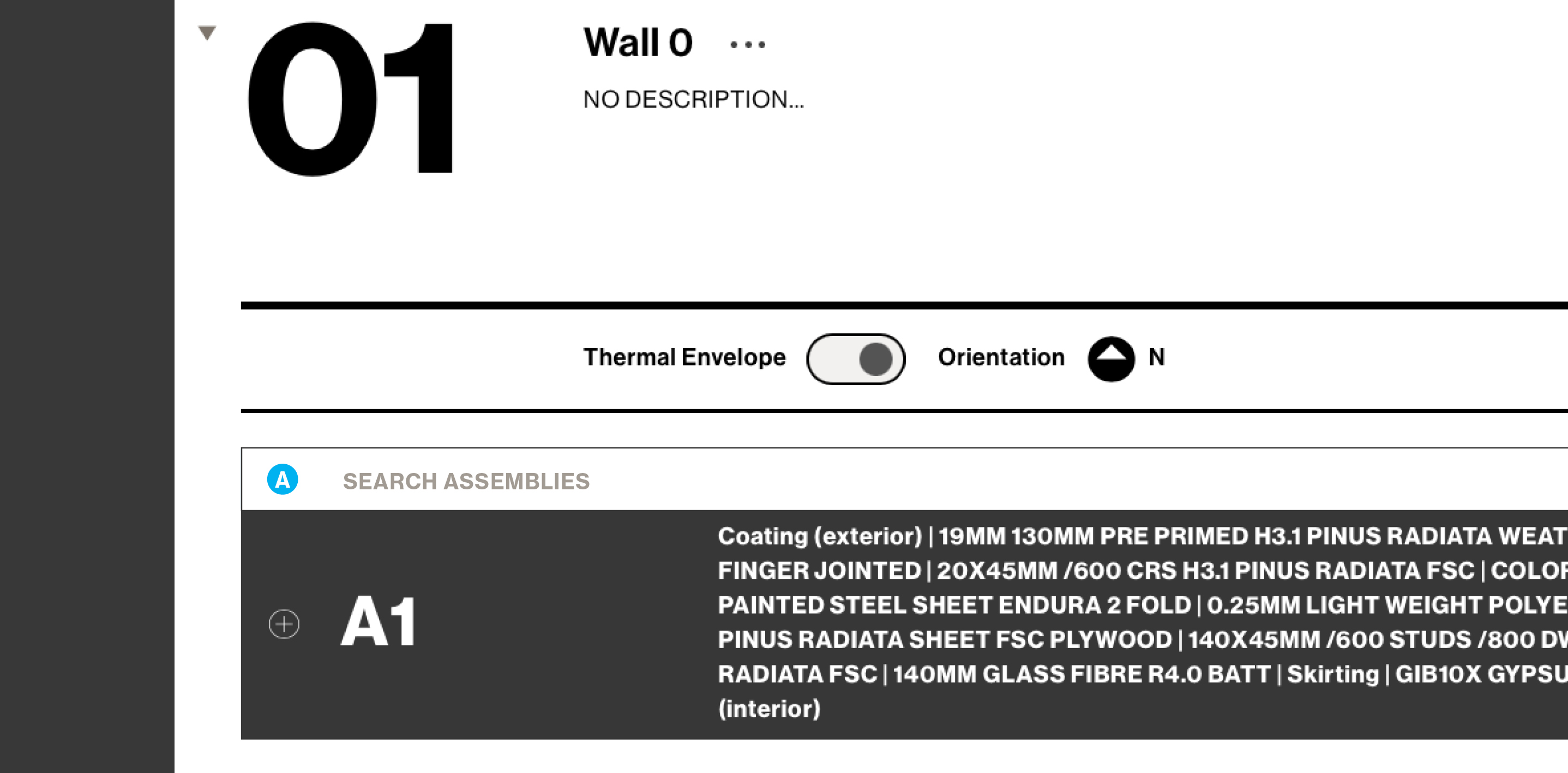
Placeholder
Actually uses a feature called Placeholder to allow for meaningful results, right from a project’s inception.
When Placeholder is turned on, quantities and rates are pre-populated with baseline data, filling in the gaps of a project with informed, contextual data until the model is complete. When using Placeholder there are a number of environmental calculation methods available. Actually lets you select the method, and ensures that all settings follow suit within the application and on the report.
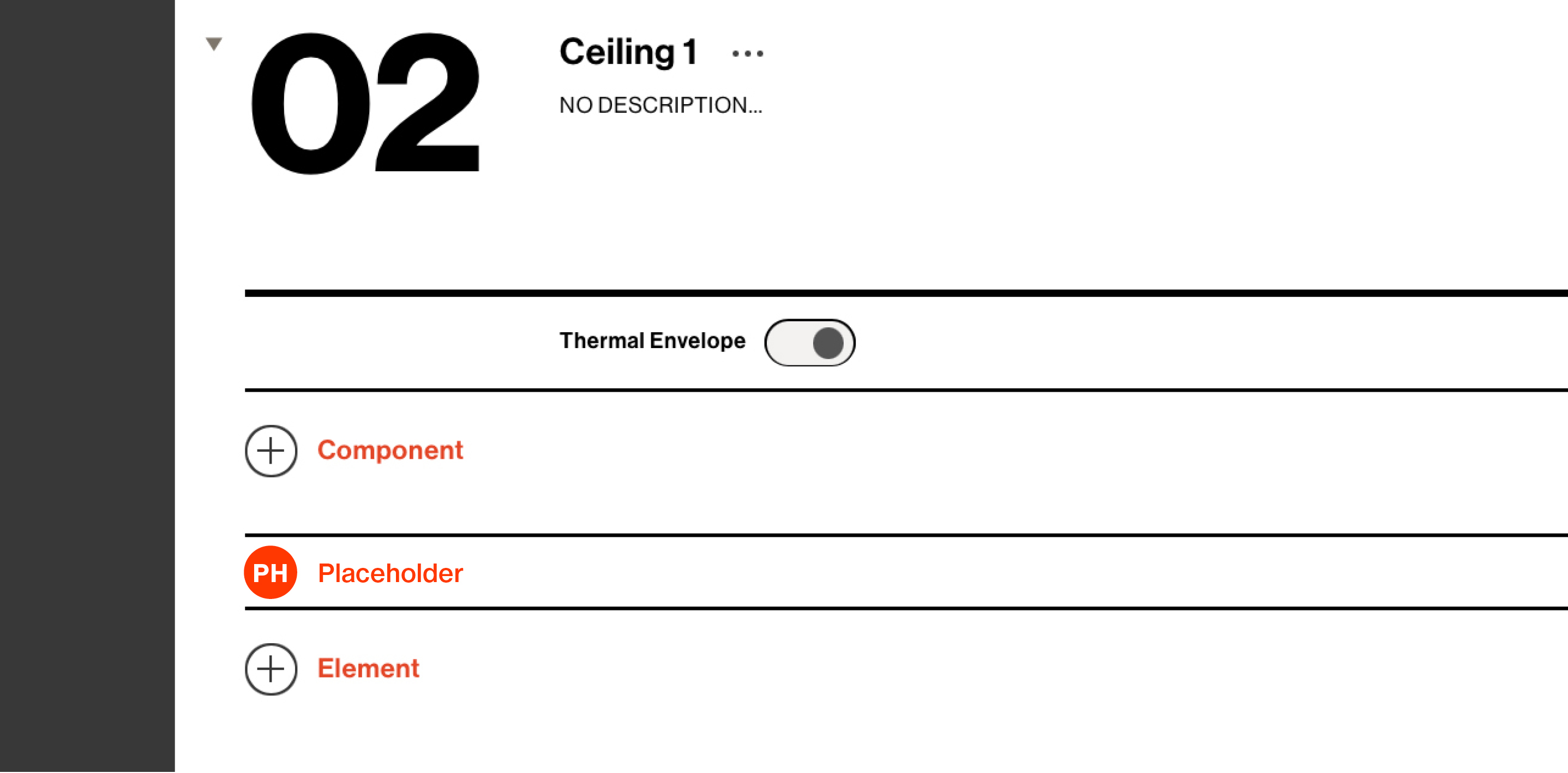
Audit
Before reports are generated Actually takes users through an easy auditing process to ensure inputs are correct and measurements are accurate. If something doesn’t add up, missing or incorrect information will be highlighted to help guide the user on how to resolve the issue.
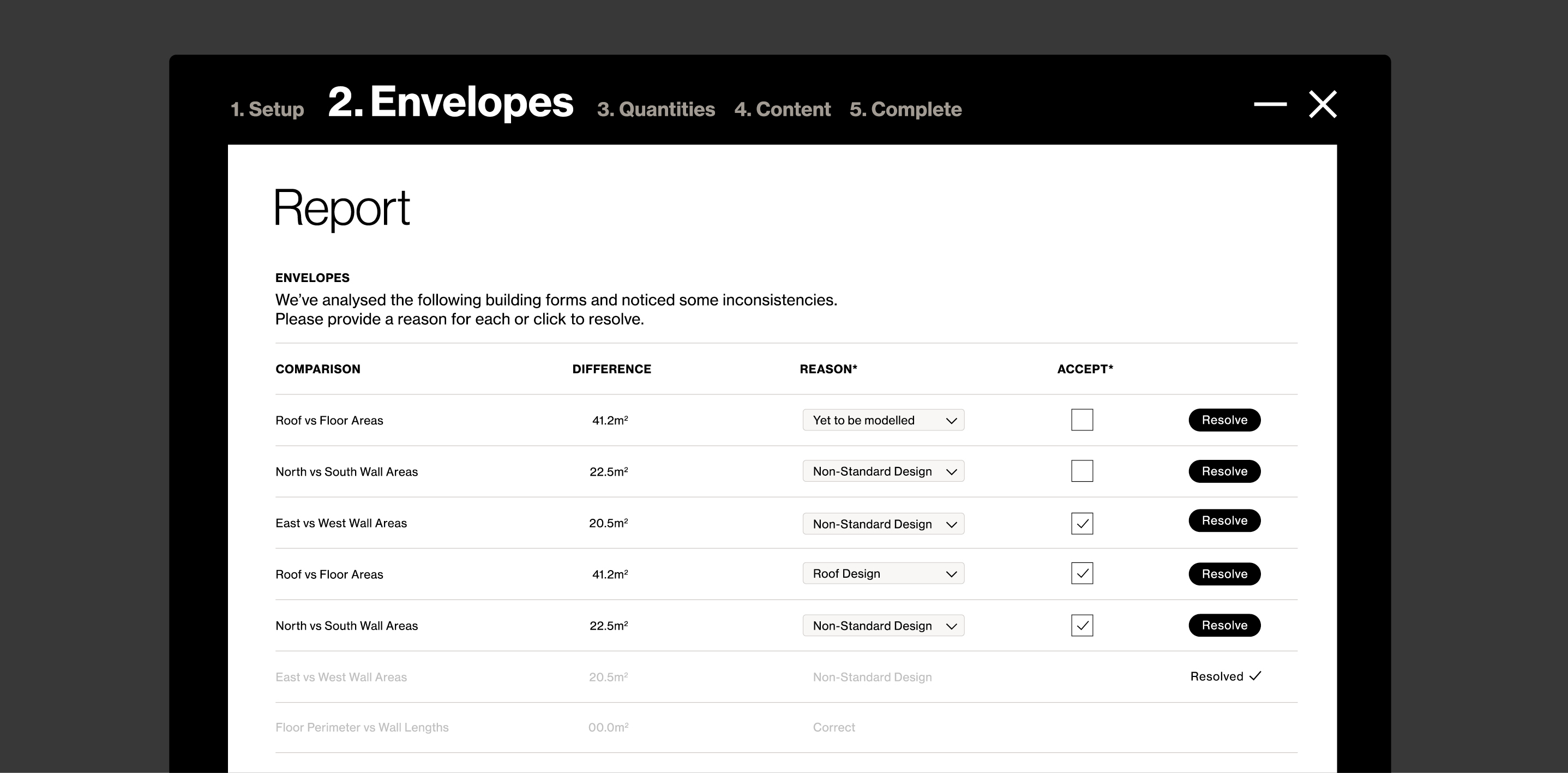
Baselines
The start of any project can feel daunting. To help take away some of the guess work Actually provides Baselines for every project. Baselines are cost and carbon estimate averages that Actually generates using data points from projects comparable to the one the user is working on. This makes it easier for users to evaluate project estimates and goals in comparison to projects of a similar scale.

Assemblies
In Actually, users can generate their own Assemblies from their most commonly used build components. These Assemblies can then be added to the Elements of a project quickly, and without the need to manually input favoured materials for each new project. User-generated Assemblies are available across all of the user’s projects for maximum efficiency.

Placeholder
Actually uses a feature called Placeholder to allow for meaningful results, right from a project’s inception.
When Placeholder is turned on, quantities and rates are pre-populated with baseline data, filling in the gaps of a project with informed, contextual data until the model is complete. When using Placeholder there are a number of environmental calculation methods available. Actually lets you select the method, and ensures that all settings follow suit within the application and on the report.

Auditor
Before reports are generated Actually takes users through an easy auditing process to ensure inputs are correct and measurements are accurate. If something doesn’t add up, Auditor will highlight this and guide the user on how to resolve the issue. Auditor can be accessed at any stage of the project.

Also included:
Version history
Keep track of changes with clearly labelled versioning, across every stage of the design process.
Collaborative projects
Invite other Actually users to contribute to the project.
Invoice clients directly
Minimise office outgoings by sending Actually invoices directly to clients, as part of the project set up process.
Cloud based
Actually is cloud based, so projects are always accessible with a Wi-Fi connection.
Flexible pricing
Actually has different pricing options for Individuals and teams, monthly or yearly billing, so users can choose the plan that is right for them.
Visit our pricing page for more information.